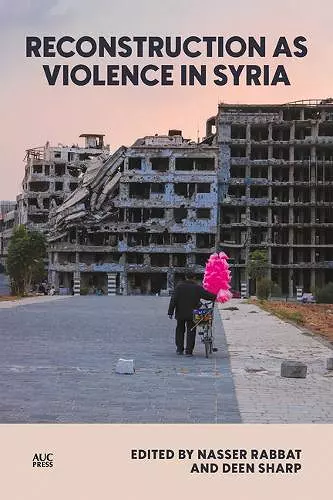Reconstruction as Violence in Assad's Syria
Pascal Menoret editor Deen Sharp editor Dr Noura Wahby editor Dr Nasser Rabbat editor
Format:Hardback
Publisher:American University in Cairo Press
Publishing:24th Jun '25
£65.00
This title is due to be published on 24th June, and will be despatched as soon as possible.

A sustained critique of postwar reconstruction in Syria as a politically neutral process
In 2011, emboldened by the Arab Spring, the Syrians rose up against their government. The Syrian regime used violence to suppress the protests, so that what began as pro-democracy protests eventually morphed into a civil war with heavy outside intervention. Today, the Assad regime has fallen, but large parts of the country lie in ruins, millions of Syrians are displaced, and the economy is in freefall. Reconstruction as Violence delves into the complex interplay of post-conflict reconstruction in Syria, challenging the traditionally held dichotomy between the end of violence and the commencement of rebuilding.
The contributors to this volume—architects, urbanists, geographers, and historians—employ critical concepts such as urbicide, domicide, and “civilian crisis architecture” to argue against the conventional theoretical frameworks that support a neat separation of phases. They illustrate how reconstruction often extends the dynamics of conflict into the urban and social realms, suggesting that the built environment becomes a battleground for further violence. They emphasize the importance of acknowledging the historical, economic, societal, legal, and bureaucratic contexts that shape reconstruction efforts, arguing for initiatives that prioritize equity, inclusivity, and community participation.
Reconstruction as Violence starkly underscores the authors’ stance that to overlook any of these dimensions, or to disengage from the reconstruction process altogether, represents a political choice with potentially detrimental effects on Syria and beyond in the Arab world, where countries like Palestine, Yemen, Libya, Iraq, Lebanon, and Sudan are undergoing similar cycles of destruction and rebuilding. It calls for a reimagined approach to reconstruction, one that fosters peace, resilience, and social justice in post-conflict societies.
Contributors:
Sawsan Abou Zainedin, Madaniya, London, UK
Ammar Azzouz, University of Oxford, UK
Valérie Clerc, Institut de Recherche pour le Développement, France
Emma Katherine DiNapoli, human rights lawyer, London, UK
Omar Ferwati, Goldsmiths, University of London, UK
Rim Lababidi, architect and independent scholar, Ohio, USA
Wendy Pullan, University of Cambridge, UK
Nasser Rabbat, Massachusetts Institute of Technology, Cambridge, MA, USA
Hashim Sarkis, Massachusetts Institute of Technology, Cambridge, MA, USA
Deen Sharp, London School of Economics, UK
Heghnar Watenpaugh, University of California Davis, CA, USA
"This is an immensely important work and particularly timely as it emerges after the fall of the Assad regime. Whether Syria is restored or reconstructed, this no longer need be viewed as violence as long as Syrians, both in the country and abroad, are part of the process of recovering from the existential challenges that the country has most recently faced."—Dawn Chatty, University of Oxford
"In post-Assad Syria, a country grappling with recovery, this book is more timely than ever. Reconstruction as Violence in Syria challenges conventional narratives that frame reconstruction as merely an act of development. It reveals the entanglement of destruction and construction, highlighting how violence shapes urban space, built heritage, memory, and citizenship. Through the book's chapters, we come to understand how architecture takes shape as an act of either sustaining or resisting oppressive structures in Syria’s evolving socio-political landscape—one shaped by both hope and anticipation."—Wesam Al Asali, IE School of Architecture and Design
"This long-awaited work by a significant and unique group of Syrian and non-Syrian scholars, practitioners, and activists synthesizes their collective visions based on long-term experience and collaborations in different contexts. Arising from a pivotal moment in Syrian history after the collapse of the Assad regime, this work should inspire readers not only to reconsider the past through reconstruction as an act of violence but also the present through reconstruction as a form of transitional justice and the future through reconstruction as a pathway to peace."—Ahmad Sukkar, University of Sharjah and Damascus University
“The essays in this volume demonstrate how the Assad regime engaged in urbicide not merely as an unintended consequence of military victory, but as a deliberate strategy to remake Syria's social fabric and render it more homogenous and more pliant. Sharply written, theoretically sophisticated, and factually grounded, the chapters problematize the conventional distinction between wartime destruction and post-conflict reconstruction while never losing sight of ordinary Syrians whose homes—and lives—have been shattered by violence.”—Daniel Neep, Brandeis University
ISBN: 9781649034137
Dimensions: unknown
Weight: unknown
272 pages